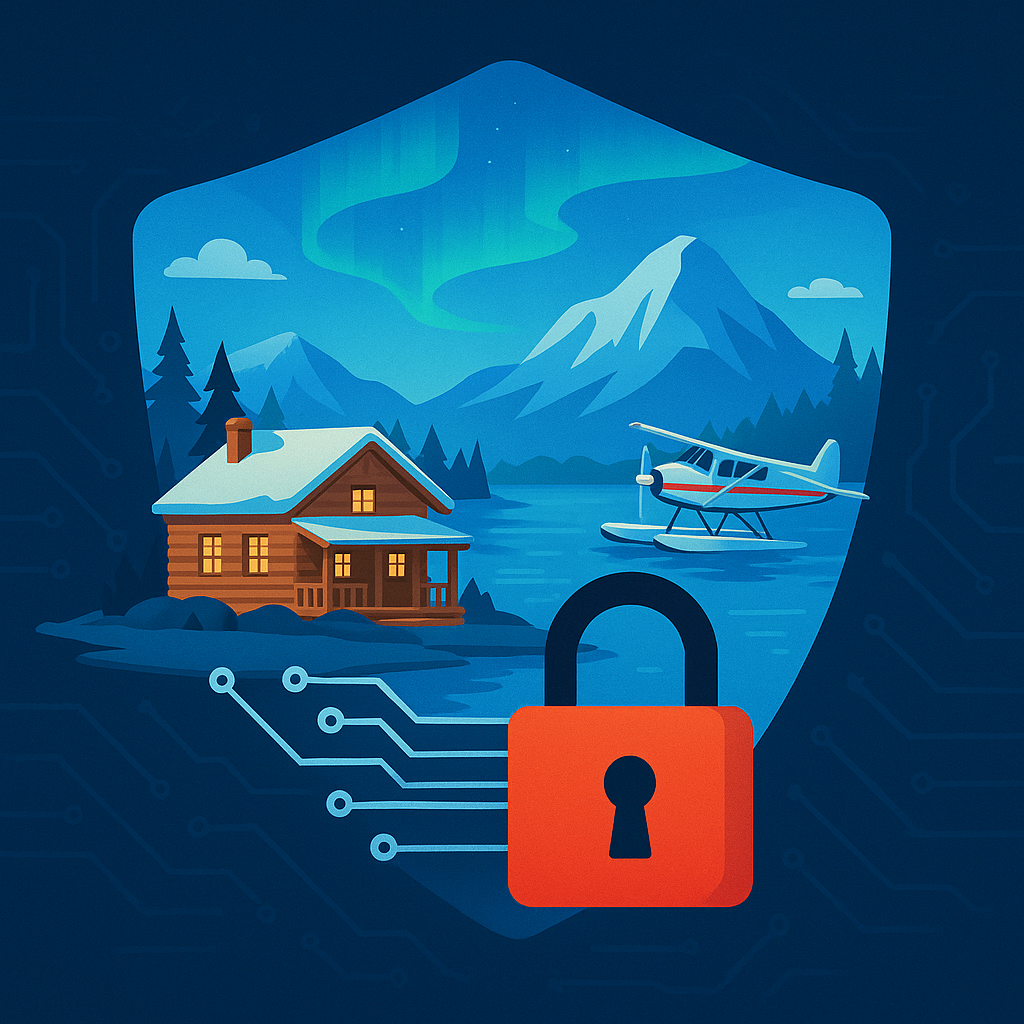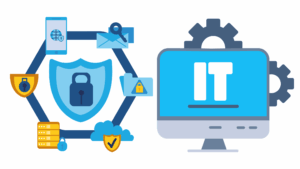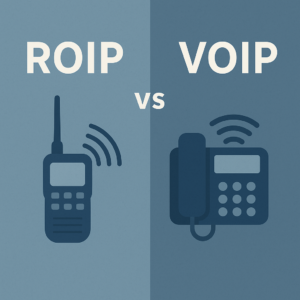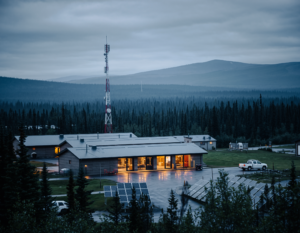Tourism in Northern Canada is thriving again. Planes are full, lodges are booked, and guests from around the world are coming to experience the raw beauty of the North. Picture a traveler landing on a charter flight after days of planning, excited to check into a boutique lodge. The guest expects warmth, safety, and smooth service—but behind the front desk and booking system, hidden risks could derail the entire experience.
As visitor numbers rise, so do the cyber risks. From boutique hotels and lodges to charter flight operators, Northern tourism—especially in the Northwest Territories, Yukon, and Nunavut—is now firmly in the crosshairs of cybercriminals.
The Silent Threat Behind the Guest Experience
When travelers arrive in the North, they expect safety, comfort, and reliability. They hand over credit cards, passports, and personal details without hesitation. They log into Wi-Fi networks. They trust that behind the wilderness adventure is a modern, secure operation.
But what happens when that trust is broken?
The Growing Epidemic
New research shows 82% of North American hotels experienced a cyberattack last summer. The travel and tourism sector now ranks third globally in attack volume—behind only finance and healthcare. Hackers are targeting hotels, lodges, and airlines because they know two things: the data is valuable, and defenses are often weak.
In 2023, MGM Resorts in Las Vegas was crippled by a cyberattack. Guests were locked out of rooms, slot machines froze, and bookings ground to a halt. The cost: over $100 million. If the largest resorts in the world can be shut down, what about smaller Northern operators with no dedicated IT department?
It’s already happening. European hotels have seen guest data stolen through compromised reservation systems. Lodges in Canada have lost entire booking databases to ransomware. And in 2023, WestJet confirmed a cyberattack that exposed sensitive customer data—including passport numbers and travel information for thousands of passengers. For a Northern operator relying heavily on regional air travel, this kind of breach is more than an inconvenience; it undermines confidence in the entire travel ecosystem.
Even industry associations are being targeted. ACTA, a Canadian travel association, suffered a breach in 2024 that forced it to warn members to monitor for suspicious activity. Across Canada, dozens of tourism-related businesses have quietly faced breaches that never made the news but had severe operational and reputational impacts.
Why the North Is Especially Exposed
Operators in the Northwest Territories, Yukon, and Nunavut face unique challenges:
- Seasonal and transient staff with little cyber training
- Outdated point-of-sale and booking systems
- Sparse or part-time IT coverage
- Heavy reliance on guest Wi-Fi
- Sensitive data like credit cards, passports, and itineraries
And there’s another risk: being the weak link. Smaller hotels, motels, and tour operators may not seem like prime targets, but they’re often hacked first—then used as stepping stones to compromise larger partners. If your system is connected to airline portals, online booking aggregators, or payment processors, an attack on you could ripple outward, damaging not just your reputation but your business relationships.
Beyond Computers: Physical Security Systems at Risk
Cyber risk isn’t just about laptops and Wi-Fi. Modern tourism operators depend on physical security systems that are just as vulnerable:
- Access control systems (Keyscan, cardlocks, and keyless entry): Researchers recently found a flaw in Dormakaba locks, used in millions of hotels worldwide, that allowed hackers to bypass room security entirely.
- Booking and reservation platforms: Cloud-based systems can be hijacked, locking operators out at peak season.
- Security cameras: Many are internet-connected, meaning they can be hacked to spy on staff, guests, or operations.
A compromised lock or camera system isn’t just an inconvenience—it’s a direct safety risk. And when guests feel unsafe, they don’t come back.
The Liability You Can’t Ignore
A cyber incident isn’t just an IT problem. It’s a business problem:
- Lost revenue when booking systems go down in peak season
- Reputational damage when guests find out their information was stolen
- Legal and regulatory penalties under Canadian privacy law
- PCI fines for mishandling payment card data
- Supply chain risk if your breach exposes business partners
And yet, in the North, it’s still common to see credit cards emailed between staff, numbers written on notepads, or guest payment details stored in unsecured spreadsheets. These practices are not just risky—they’re violations of PCI DSS compliance standards.
The Human Side of a Cyberattack
Picture this: A guest arrives after a long journey, only to learn their reservation is missing because the booking system was encrypted by ransomware. Or worse, a loyal customer calls weeks later, furious that their credit card was compromised after staying at your property. In small communities where word travels fast, one breach doesn’t just hurt your business—it hurts the entire tourism network.
A Positive Case Study: Prevention Pays Off
One Northern lodge took proactive steps after realizing their systems were outdated and vulnerable. Instead of waiting for disaster, they invested in:
- Segmenting their guest Wi-Fi from internal systems
- Implementing multi-factor authentication for staff logins
- Training seasonal staff on phishing awareness
- Backing up their reservation system daily to a secure, offsite location
- Updating physical security systems, including access control and cameras, with stronger safeguards
Months later, when a phishing email slipped through and an employee clicked a malicious link, the attack was contained within minutes. Systems were isolated, backups were restored, and operations continued without guests even noticing. Instead of days of downtime and reputational fallout, it was a small hiccup—and a major wake-up call. Their foresight paid for itself many times over.

What Needs to Change
You don’t need to become a cybersecurity expert. But you do need to treat digital risk like physical risk. You’d never leave your lodge unlocked at night. Why leave your network wide open?
3 Critical Cybersecurity Actions for Northern Operators
1. Train Staff on Cyber Awareness
Your seasonal and front-line staff are your first line of defense.
- Run quarterly phishing simulations
- Teach red flags: suspicious emails, fake invoices, urgent sender requests
- Use real-life examples from Northern operations
2. Secure Access with MFA and Segmentation
- Enforce MFA across all systems: booking, payroll, guest data
- Isolate networks: guest Wi-Fi must be separate from operations
- Apply zero-trust security to all smart devices and IoT tools
3. Protect Guest Payments
- Use point-to-point encryption and tokenization
- Ensure PCI DSS compliance for all card transactions
- Monitor transactions in real time and segment POS networks
The Northern Reality
Tourism in the North runs lean. IT is often an afterthought. But when your reputation, guest experience, and revenue rely on data and uptime, cybersecurity is no longer optional—it’s mission-critical.
This isn’t about expensive tools. It’s about preventing simple, devastating mistakes. It’s about ensuring guests can trust you with their data as much as they trust you with their safety.
Next Steps for Northern Operators
CasCom specializes in cybersecurity-first IT support for high-risk, high-stakes industries. We know what it takes to protect mining sites, healthcare networks, and financial systems—and we bring that same discipline to tourism. That includes securing not just your computers, but your cameras, access control systems, booking platforms, and every device guests interact with.
If you’re a hotel, lodge, airline, or tour operator in Yellowknife, the Northwest Territories, Yukon, or Nunavut, you can’t afford to wait for a breach. The cost is too high, and recovery is too slow.
Tourism season is too short to lose to a preventable breach.
Book your free cyber risk snapshot now—before your guests arrive.













